初中英语常用词语辨析大全
- 格式:doc
- 大小:293.00 KB
- 文档页数:64

英语常考近义词成语辨析100组1. 喜欢 vs. 爱好 - 指对某一事物或活动的有好感或偏爱。
2. 开心 vs. 快乐 - 表示愉快的心情。
3. 困惑 vs. 迷惑 - 表示对某事情感到疑惑或莫名其妙。
4. 同情 vs. 同情心 - 表示对他人的困难或苦难感到理解和关切。
5. 感激 vs. 感谢 - 表示对别人的帮助或恩惠表示谢意。
6. 独特 vs. 特殊 - 表示与众不同或与常规不同。
7. 敏捷 vs. 灵活 - 表示动作或思维的迅捷程度。
8. 忠诚 vs. 诚实 - 表示对某人或某事的忠心和坦诚。
9. 本领 vs. 能力 - 表示某种技能或才能。
10. 合理 vs. 公正 - 表示合乎逻辑或公平正义。
11. 危险 vs. 风险 - 表示存在威胁或可能带来危险的情况。
12. 政府 vs. 政权 - 表示治理国家的机构或组织。
13. 友谊 vs. 友情 - 表示朋友之间的情感和关系。
14. 丰富 vs. 富裕 - 表示财富或资源充足。
15. 智慧 vs. 聪明 - 表示智力水平较高或思维敏捷。
16. 关注 vs. 关心 - 表示对某事物或某人的关注和关心。
17. 反对 vs. 抵制 - 表示不支持或反抗某一事物或行为。
18. 容易 vs. 简单 - 表示易于做到或理解。
19. 紧张 vs. 担忧 - 表示焦虑或担忧的情绪。
20. 信任 vs. 依赖 - 表示对某人或某事物的信心或依赖。
21. 目标 vs. 任务 - 表示需要完成的工作或目标。
22. 利益 vs. 好处 - 表示从某事物中获得的利益或好处。
23. 减少 vs. 缩小 - 表示数量或规模的减少。
24. 批评 vs. 指责 - 表示对某人或某事物的不满或责备。
25. 传统 vs. 习俗 - 表示某一群体传承下来的风俗或习惯。
26. 科学 vs. 学问 - 表示知识体系或某一学科的研究。
27. 知识 vs. 智慧 - 表示学习和了解的内容和能力。

【导语】中考英语词语辨析主要出现在单选或完形填空中,在平常的英语学习中,同学们可能缺少系统的词语辨析训练,所以考试遇到这类考点总是丢分,今天⽆忧考和⼤家分享中考英语最常考的50组重点词语辨析,帮助⼤家扫清词语辨析的障碍!提⾼考试分数,⼀起看看吧。
中考英语最常考50组重点词语辨析(⼀)1. after, in这两个介词都可以表⽰“……(时间)以后”的意思。
after 以过去为起点,表⽰过去⼀段时间之后,常⽤于过去时态的句⼦中。
She went after three days.她是三天以后⾛的。
in 以现在为起点,表将来⼀段时间以后,常⽤于将来时态的句⼦中。
She will go in three days.她三天以后要⾛。
2. how long, how often, how soonhow long指多长时间,主要⽤来对⼀段时间(如three days, four weeks 等)提问。
How long ago was it?这是多久前的事了?how often指每隔多久,主要⽤来对频率副词或状语(如once a week等)提问。
—How often does he come here? —Once a month.他(每隔)多久来⼀次?每⽉⼀次?how soon指再过多久,主要⽤来对表⽰将来的⼀段时间(in an hour, in two weeks 等)提问。
How soon can you come?你多快能赶来?3. few, a few, little, a little, several, somefew 和little的意思是否定的,表⽰“很少”或“⼏乎没有”;⽽a few和a little的意思是肯定的,表⽰“有⼀些,有⼀点⼉”。
few 和 a few修饰可数名词;little 和 a little 修饰不可数名词。
several⽤于修饰可数名词,语意⽐a few和some更肯定,含有“好⼏个”的意思。

初中英语常见的30组词汇辨析!1.out of question 毫无疑问的【例句】He is out of question the best student in the whole class.毫无疑问,他是全班最优秀的学生。
【例句】His success is out of question.他的成功不成问题。
out of the question 不可能的【例句】It's out of the question. I don't want to see her.这是不可能的。
我不想见到她。
【例句】For the homeless, private medical care is simply out of the question对于无家可归的人而言,私人医疗纯粹是天方夜谭。
2.on fire 着火,起火【例句】The workshop is on fire.车间 [工厂] 起火了。
【例句】Something was on fire.有东西着火了。
on the fire 在火上【例句】The kettle was boiling away on the fire.水壶里的水在炉火上开个不停。
【例句】Put another lump of coal on the fire.往炉火上再加放一块煤。
3.in office 在职的,执政的【例句】He had nothing tangible to show off three years in office.他为官三年,无实绩可言。
【例句】Which political party is in office in your country ?贵国是哪一个政党执政?in the office 在办公室里【例句】He was wanted in the office.有人在办公室找他。
【例句】Would you introduce me to others in the office?你能把我介绍给办公室的其他人吗?4.the doctor and teacher 指一个人,既是医生又是老师。
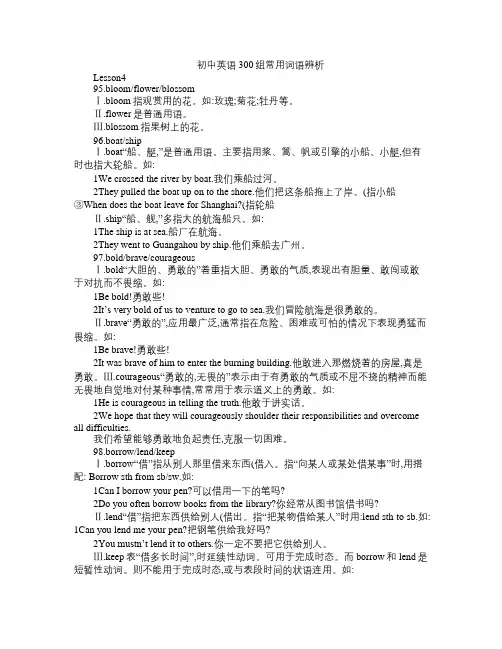
初中英语300组常用词语辨析Lesson495.bloom/flower/blossomⅠ.bloom指观赏用的花。
如:玫瑰;菊花;牡丹等。
Ⅱ.flower是普通用语。
Ⅲ.blossom指果树上的花。
96.boat/shipⅠ.boat“船、艇,”是普通用语。
主要指用浆、篙、帆或引擎的小船、小艇,但有时也指大轮船。
如:1We crossed the river by boat.我们乘船过河。
2They pulled the boat up on to the shore.他们把这条船拖上了岸。
(指小船③When does the boat leave for Shanghai?(指轮船Ⅱ.ship“船、舰,”多指大的航海船只。
如:1The ship is at sea.船厂在航海。
2They went to Guangahou by ship.他们乘船去广州。
97.bold/brave/courageousⅠ.bold“大胆的、勇敢的”着重指大胆、勇敢的气质,表现出有胆量、敢闯或敢于对抗而不畏缩。
如:1Be bold!勇敢些!2It’s very bold of us to v enture to go to sea.我们冒险航海是很勇敢的。
Ⅱ.brave“勇敢的”,应用最广泛,通常指在危险、困难或可怕的情况下表现勇猛而畏缩。
如:1Be brave!勇敢些!2It was brave of him to enter the burning building.他敢进入那燃烧着的房屋,真是勇敢。
Ⅲ.courageous“勇敢的,无畏的”表示由于有勇敢的气质或不屈不挠的精神而能无畏地自觉地对付某种事情,常常用于表示道义上的勇敢。
如:1He is courageous in telling the truth.他敢于讲实话。
2We hope that they will courageously shoulder their responsibilities and overcome all difficulties.我们希望能够勇敢地负起责任,克服一切困难。
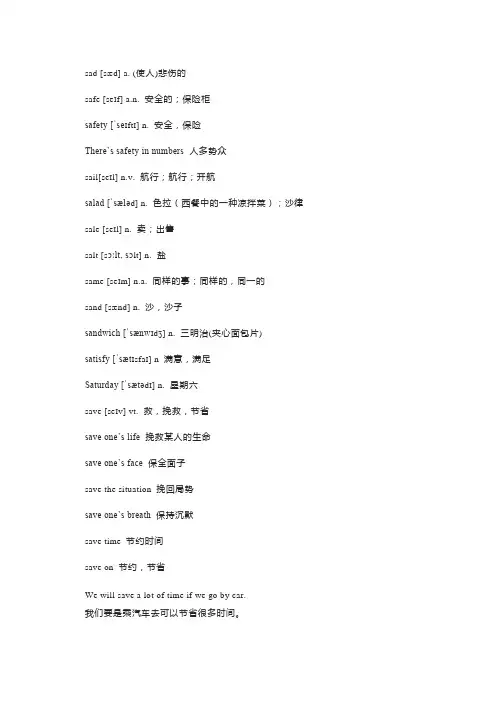
sad [sæd] a. (使人)悲伤的safe [seɪf] a.n. 安全的;保险柜safety [ˈseɪftɪ] n. 安全,保险There’s safety in numbers 人多势众sail[seɪl] n.v. 航行;航行;开航salad [ˈsæləd] n. 色拉(西餐中的一种凉拌菜);沙律sale [seɪl] n. 卖;出售salt [sɔːlt, sɔlt] n. 盐same [seɪm] n.a. 同样的事;同样的,同一的sand [sænd] n. 沙,沙子sandwich [ˈsænwɪdʒ] n. 三明治(夹心面包片)satisfy [ˈsætɪsfaɪ] n 满意,满足Saturday [ˈsætədɪ] n. 星期六save [seɪv] vt. 救,挽救,节省save one’s life 挽救某人的生命save one’s face 保全面子save the situation 挽回局势save one’s breath 保持沉默save time 节约时间save on 节约,节省We will save a lot of time if we go by car.我们要是乘汽车去可以节省很多时间。
say(said, said) [seɪ] vt. 说,讲go without saying 显而易见say to oneself 自言自语scarf[skɑːf] n. 领巾;围巾school [skuːl] n. 学校schoolbag['sku:lbæg] n. 书包science [ˈsaɪəns] n. 科学,自然科学scientist[ˈsaɪəntɪst] n. 科学家scissors [ˈsɪzəz] n. 剪刀score [skɔː(r)] n.&v. 得分;分数a score-keeper 记分员a score –sheet 记分单a score of 二十个screen [skriːn] n. 幕,荧光屏sea[siː] n. 海,海洋in the sea 在海里on the sea 在海滨by sea 乘船a sea of flames 一片火海search [sɜːtʃ] n.&v. 搜寻,搜查search for sb/sth 寻找某人/某物Rescue workers searched all night in the hope of finding more survivors.营救人员彻夜搜寻,希望找到更多的幸存者。

初中英语必背词语辨析20组初中英语必背词语辨析20组导语:对同义、近义、形近词汇以及词组与习惯用法的辨析一直都是初中英语的高频考点,也是同学们很容易出错的地方。
今天,店铺给大家总结了初中英语中考查频率最高的20组词的辨析,一起来学习吧!1.after, in这两个介词都可以表示“……(时间)以后”的意思。
after 以过去为起点,表示过去一段时间之后,常用于过去时态的句子中。
如:She went after three days. 她是三天以后走的。
in 以现在为起点,表将来一段时间以后,常用于将来时态的句子中。
如:She will go in three days. 她三天以后要走。
2.how long, how often, how soonhow long指多长时间,主要用来对一段时间(如three days,four weeks 等)提问。
如:How long ago was it? 这是多久前的事了?how often指每隔多久,主要用来对频率副词或状语(如once a week等)提问。
如:How often does he come here? Once a month。
他(每隔)多久来一次?每月一次。
how soon指再过多久,主要用来对表示将来的一段时间(in an hour, in two weeks 等)提问。
如:How soon can you come? 你多快能赶来?3.few, a few, little, a little, several, somefew和little的意思是否定的,表示“很少”或“几乎没有”;而a few和a little的意思是肯定的,表示“有一些,有一点儿”。
few和 a few修饰可数名词;little和 a little修饰不可数名词。
several用于修饰可数名词,语意比a few和some更肯定,含有“好几个”的意思。
some可修饰可数名词,也可修饰不可数名词,从数量上说,它有时相当于a few 或 a little,有时指更多一些的数量。
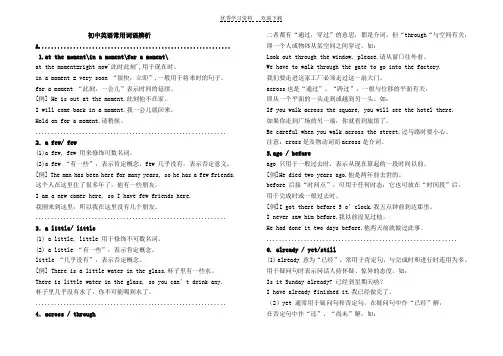
初中英语常用词语辨析A.............................................................1.at the moment\in a moment\for a moment\at the moment=right now"此时此刻",用于现在时。
in a moment = very soon “很快,立即”,一般用于将来时的句子。
for a moment “此刻,一会儿”表示时间的延续。
[例] He is out at the moment.此刻他不在家。
I will come back in a moment.我一会儿就回来。
Hold on for a moment.请稍候。
............................................................. 2.a few/ few(1)a few, few 用来修饰可数名词。
(2)a few “有一些”,表示肯定概念,few 几乎没有,表示否定意义。
[例] The man has been here for many years, so he has a few friends. 这个人在这里住了很多年了,他有一些朋友。
I am a new comer here, so I have few friends here.我刚来到这里,所以我在这里没有几个朋友。
............................................................. 3.a little/ little(1) a little, little 用于修饰不可数名词。
(2) a little “有一些”,表示肯定概念。
little “几乎没有”,表示否定概念。
[例] There is a little water in the glass.杯子里有一些水。
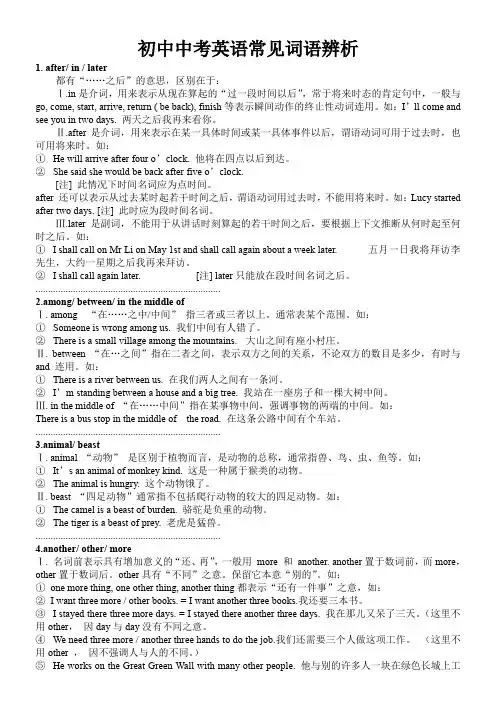
初中中考英语常见词语辨析1. after/ in / later都有“……之后”的意思,区别在于:Ⅰ.in是介词,用来表示从现在算起的“过一段时间以后”,常于将来时态的肯定句中,一般与go, come, start, arrive, return ( be back), finish等表示瞬间动作的终止性动词连用。
如:I’ll come and see you in two days. 两天之后我再来看你。
Ⅱ.after是介词,用来表示在某一具体时间或某一具体事件以后,谓语动词可用于过去时,也可用将来时。
如:①He will arrive after four o’clock. 他将在四点以后到达。
②She said she would be back after five o’clock.[注] 此情况下时间名词应为点时间。
after 还可以表示从过去某时起若干时间之后,谓语动词用过去时,不能用将来时。
如:Lucy started after two days. [注] 此时应为段时间名词。
Ⅲ.later是副词,不能用于从讲话时刻算起的若干时间之后,要根据上下文推断从何时起至何时之后。
如:①I shall call on Mr Li on May 1st and shall call again about a week later. 五月一日我将拜访李先生,大约一星期之后我再来拜访。
②I shall call again later. [注] later只能放在段时间名词之后。
..........................................................................2.among/ between/ in the middle ofⅠ. among “在……之中/中间”指三者或三者以上。
通常表某个范围。
如:①Someone is wrong among us. 我们中间有人错了。
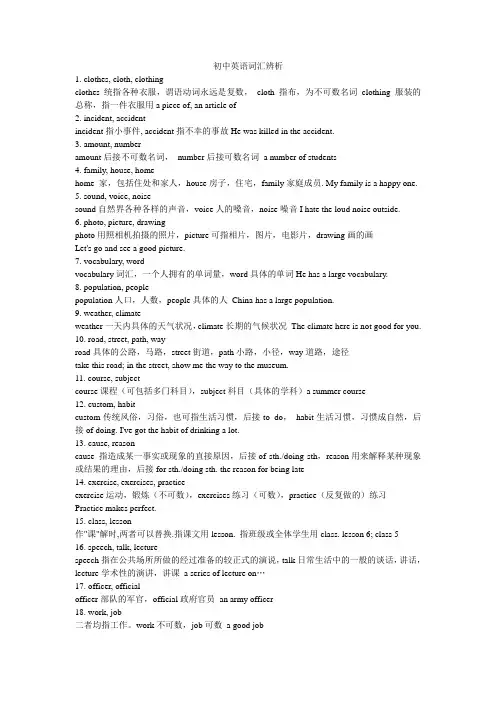
初中英语词汇辨析1. clothes, cloth, clothingclothes统指各种衣服,谓语动词永远是复数,cloth指布,为不可数名词clothing 服装的总称,指一件衣服用a piece of, an article of2. incident, accidentincident指小事件, accident指不幸的事故He was killed in the accident.3. amount, numberamount后接不可数名词,number后接可数名词a number of students4. family, house, homehome 家,包括住处和家人,house房子,住宅,family家庭成员. My family is a happy one.5. sound, voice, noisesound自然界各种各样的声音,voice人的嗓音,noise噪音I hate the loud noise outside.6. photo, picture, drawingphoto用照相机拍摄的照片,picture可指相片,图片,电影片,drawing画的画Let's go and see a good picture.7. vocabulary, wordvocabulary词汇,一个人拥有的单词量,word具体的单词He has a large vocabulary.8. population, peoplepopulation人口,人数,people具体的人China has a large population.9. weather, climateweather一天内具体的天气状况,climate长期的气候状况The climate here is not good for you.10. road, street, path, wayroad具体的公路,马路,street街道,path小路,小径,way道路,途径take this road; in the street, show me the way to the museum.11. course, subjectcourse课程(可包括多门科目),subject科目(具体的学科)a summer course12. custom, habitcustom传统风俗,习俗,也可指生活习惯,后接to do,habit生活习惯,习惯成自然,后接of doing. I've got the habit of drinking a lot.13. cause, reasoncause 指造成某一事实或现象的直接原因,后接of sth./doing sth,reason用来解释某种现象或结果的理由,后接for sth./doing sth. the reason for being late14. exercise, exercises, practiceexercise运动,锻炼(不可数),exercises练习(可数),practice(反复做的)练习Practice makes perfect.15. class, lesson作"课"解时,两者可以替换.指课文用lesson. 指班级或全体学生用class. lesson 6; class 516. speech, talk, lecturespeech指在公共场所所做的经过准备的较正式的演说,talk日常生活中的一般的谈话,讲话,lecture学术性的演讲,讲课a series of lecture on…17. officer, officialofficer部队的军官,official政府官员an army officer18. work, job二者均指工作。
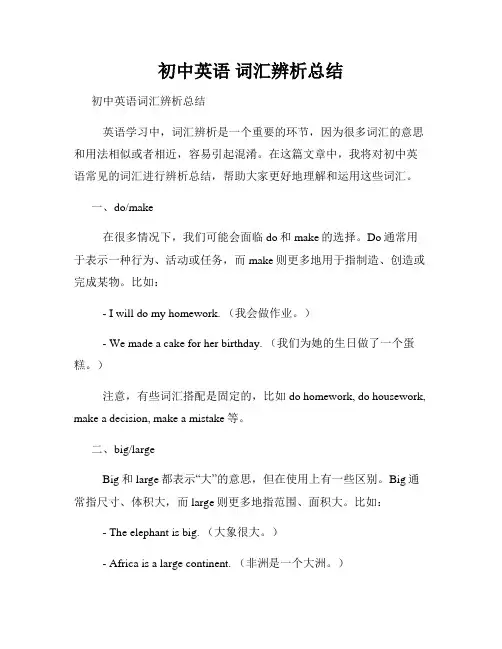
初中英语词汇辨析总结初中英语词汇辨析总结英语学习中,词汇辨析是一个重要的环节,因为很多词汇的意思和用法相似或者相近,容易引起混淆。
在这篇文章中,我将对初中英语常见的词汇进行辨析总结,帮助大家更好地理解和运用这些词汇。
一、do/make在很多情况下,我们可能会面临do和make的选择。
Do通常用于表示一种行为、活动或任务,而make则更多地用于指制造、创造或完成某物。
比如:- I will do my homework. (我会做作业。
)- We made a cake for her birthday. (我们为她的生日做了一个蛋糕。
)注意,有些词汇搭配是固定的,比如do homework, do housework, make a decision, make a mistake等。
二、big/largeBig和large都表示“大”的意思,但在使用上有一些区别。
Big通常指尺寸、体积大,而large则更多地指范围、面积大。
比如: - The elephant is big. (大象很大。
)- Africa is a large continent. (非洲是一个大洲。
)三、happy/gladHappy和glad都表示“高兴的”意思,但在使用上有细微差异。
Happy更通用,可以用于形容各种情绪的高兴,而glad则更强调突发的高兴、出乎意料的喜悦。
比如:- I am happy to see you. (见到你我很高兴。
)- We are glad to hear the news. (听到这个消息我们很高兴。
)四、buy/purchaseBuy和purchase都表示“购买”之意,但buy更常用,更口语化,而purchase则更正式一些。
在日常交流中,我们通常使用buy。
比如: - I bought a new book. (我买了一本新书。
)- He purchased a car last week. (他上周购买了一辆车。
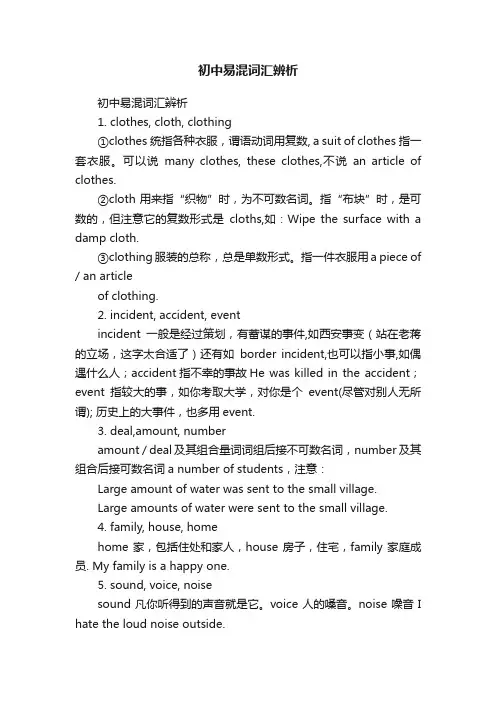
初中易混词汇辨析初中易混词汇辨析1. clothes, cloth, clothing①clothes统指各种衣服,谓语动词用复数, a suit of clothes指一套衣服。
可以说many clothes, these clothes,不说an article of clothes.②cloth 用来指“织物”时,为不可数名词。
指“布块”时,是可数的,但注意它的复数形式是cloths,如:Wipe the surface with a damp cloth.③clothing服装的总称,总是单数形式。
指一件衣服用a piece of / an articleof clothing.2. incident, accident, eventincident一般是经过策划,有蓄谋的事件,如西安事变(站在老蒋的立场,这字太合适了)还有如border incident,也可以指小事,如偶遇什么人;accident指不幸的事故He was killed in the accident;event指较大的事,如你考取大学,对你是个event(尽管对别人无所谓); 历史上的大事件,也多用event.3. deal,amount, numberamount / deal及其组合量词词组后接不可数名词,number及其组合后接可数名词a number of students,注意:Large amount of water was sent to the small village.Large amounts of water were sent to the small village.4. family, house, homehome家,包括住处和家人,house房子,住宅,family家庭成员. My family is a happy one.5. sound, voice, noisesound凡你听得到的声音就是它。
初中英语常见词汇辨析英语近义词辨析1.辨析:such和so:二者都表示程度,“如此;这样”,其区别为:注意:“such+a/an +adj+可数名词单数形式”可与“so+adj+a/an+可数名词单数形式”转换。
She is such a kind girl.=She is so kind a girl.2.each和every注意:each不能与almost,nearly及not搭配使用,而every可以。
Almost every window was broken.Not every student went on holiday.Each不能用于否定句,在否定句中应用none。
None of the books are mine.3.alone与lonelyShe was alone in the dark room.她独自一人呆在那间黑暗的屋子里。
He lives alone but he doesn't feel lonely.他独自生活,但并不感到孤独。
It's a lonely beach.那是一个人迹罕至的海滩。
4.stop doing sth与stop to do sth.One of +可数名词复数:……之一,做主语时,谓语动词要用单三形式。
12/ 1初中英语常见词汇辨析English is one of my favorite subjects.One of my friends knows you.5.few,a few与little,a littleThere are few eggs on the plate,so I must buy some.盘子里没几个鸡蛋了,所以我必须买一些There are a few eggs on the plate,so I needn't buy any at once.There's little milk in the glass.杯子里没多少牛奶了。
初中英语单词辨析大全以下是一些初中英语单词辨析的大全:1. accept-receive:accept 指主动接受,而 receive 指被动接受。
例如,accept a gift(主动接受礼物),receive a letter(被动收到信件)。
2. affect-effect:affect 指影响,是动词;effect 是名词,指影响或结果。
例如,the affect of the medicine on the patient(药物对病人的影响),the effect of the medicine on the patient(药物对病人的结果)。
3. amuse-entertain:amuse 指使人发笑或消遣,而 entertain 指使快乐或娱乐。
例如,amuse the children(逗孩子们开心),entertain the guests (招待客人)。
4. appearance-look:appearance 指外貌、外表,而 look 指面部表情、眼神等。
例如,appearance of the girl(女孩的外表),the look in his eyes (他的眼神)。
5. arguer-debater:arguer 指争论者、辩论者,而 debater 指辩论赛中的辩手。
例如,an arguer about politics(政治争论者),a debater in the school debate competition(校辩论赛辩手)。
6. beside-beside:beside 在旁边,指位置上的靠近;besides 除了,指除此之外的其他事物。
例如,the child sat beside his mother(孩子坐在母亲旁边),what else do you want besides this(除了这个之外你还想要什么)。
7. birth-birthday:birth 指出生,是名词;birthday 指生日,是名词。
中考英语词汇辨析1.spend,pay,cost,takesb. spend +时间/金钱 on sth. 某人在…上花费时间/金钱e.g. I spend two hours on English every day. 我每天花两小时学英语。
sb. spend +时间/金钱 (in) doing sth. 某人花费时间/金钱做某事e.g. Tom spends 5 dollar updating his computer system. Tom花五美元更新他的电脑系统。
sb. pay + 金钱 for…某人在...上花费金钱e.g. I paid 100 yuan for the shirt. 我花100元买这件T恤。
sth. cost sb. + 金钱/时间…花了某人的金钱/时间(cost的用法中,花金钱的出现频率比花时间高)e.g. It costs him ten euros. 它花了他十欧元。
It takes/took sb. +时间/金钱 to do sth. 花了某人时间/金钱做某事It takes me 6 minutes to take a shower. 冲澡花了我6分钟。
… take sb. +时间/金钱. …花了某人时间/金钱。
注意:spend和pay主语通常是人,而cost和take主语通常是物。
2.“at,on,in + 时间”at, on, in+时间,均可表示"在……的时候"。
at + 具体的时间点I get up at six o'clock in the morning . 我早晨六点起床。
Breakfast would be finished at seven.早餐将在七点结束。
on+具体某一天或具体某一个早上(下午、晚上)on Monday 在星期一on Sunday morning 在星期天早上(特指)on July 1st 在七月1日on a cold night in 1938 在1938年的一个寒冷的晚上in+具体某一年(季、月),早上,下午,晚上in 2020 在2020年in September 在九月in the morning 在早上(泛指)in the evening 在晚上可见at后跟的时间更精准,on次之,in排在最后。
1 accept/receiveⅠ. accept “接受”,表示其行为是由主观意愿决定的。
①I accepted it without question. 我毫无疑问地接受了它。
②We have accepted his proposal. 我已接受了他的建议。
Ⅱ. receive “接到、收到、受到”表示其行为与主观意愿无关。
如:①I received a letter from him. 我收到了他的来信。
②He received the present, but he did not accept. 他收到了礼物,但没有接受下来。
③He received a good education.他受到了良好的教育。
[注] 在表示接待、接见时,通常用receive, 而不用accept.如:We often receive foreign guests. 我们经常接待外宾。
2 before long/ long beforeⅠ. before long. “不久”,“不久以后”Ⅱ. long before “很早以前”,“好久以前”如:①I hope to see you again before long. 我希望不久以后再见到你。
②We finished our work long before.我们早就把工作做完了3 care (about) / take care of/ care forⅠ.take care of“照料=look after,即指喂饭照看等。
如:①Nurses take care of patients in hospital.[注]:它还可表所负的责任,如:①Mr Savage takes care of marketing and publicity. 萨维奇先生负责销售和宣传。
Ⅱ.care about表你是否认为某件事是重要的,某件事是否引起了你的兴趣或使你忧虑,常用于疑问句或否定句中,后接从句时,about一般都要省略。
初中英语常见词汇辨析英语近义词辨析1.辨析:such和so:二者都表示程度,“如此;这样”,其区别为:注意:“such+a/an +adj+可数名词单数形式”可与“so+adj+a/an+可数名词单数形式”转换。
She is such a kind girl.=She is so kind a girl.2.each和every注意:each不能与almost,nearly及not搭配使用,而every可以。
Almost every window was broken.Not every student went on holiday.Each不能用于否定句,在否定句中应用none。
None of the books are mine.3.alone与lonelyShe was alone in the dark room.她独自一人呆在那间黑暗的屋子里。
He lives alone but he doesn't feel lonely.他独自生活,但并不感到孤独。
It's a lonely beach.那是一个人迹罕至的海滩。
4.stop doing sth与stop to do sth.One of +可数名词复数:……之一,做主语时,谓语动词要用单三形式。
12/ 1初中英语常见词汇辨析English is one of my favorite subjects.One of my friends knows you.5.few,a few与little,a littleThere are few eggs on the plate,so I must buy some.盘子里没几个鸡蛋了,所以我必须买一些There are a few eggs on the plate,so I needn't buy any at once.There's little milk in the glass.杯子里没多少牛奶了。
初中英语常用词语辨析A.............................................................1.at the moment\in a moment\for a moment\at the moment=right now"此时此刻",用于现在时。
in a moment = very soon “很快,立即”,一般用于将来时的句子。
for a moment “此刻,一会儿”表示时间的延续。
[例] He is out at the moment.此刻他不在家。
I will come back in a moment.我一会儿就回来。
Hold on for a moment.请稍候。
............................................................. 2.a few/ few(1)a few, few 用来修饰可数名词。
(2)a few “有一些”,表示肯定概念,few 几乎没有,表示否定意义。
[例] The man has been here for many years, so he has a few friends. 这个人在这里住了很多年了,他有一些朋友。
I am a new comer here, so I have few friends here.我刚来到这里,所以我在这里没有几个朋友。
............................................................. 3.a little/ little(1) a little, little 用于修饰不可数名词。
(2) a little “有一些”,表示肯定概念。
little “几乎没有”,表示否定概念。
[例] There is a little water in the glass.杯子里有一些水。
There is little water in the glass, so you can’t drink any.杯子里几乎没有水了,你不可能喝到水了。
............................................................. 4.across / through 二者都有“通过,穿过”的意思,都是介词,但“through“与空间有关,即一个人或物体从某空间之间穿过,如:Look out through the window, please.请从窗口往外看。
We have to walk through the gate to go into the factory.我们要走进这家工厂必须走过这一扇大门。
across也是“通过”、“跨过”,一般与位移的平面有关,即从一个平面的一头走到或越到另一头。
如:If you walk across the square, you will see the hotel there.如果你走到广场的另一端,你就看到旅馆了。
Be careful when you walk across the street.过马路时要小心。
注意:cross是及物动词而across是介词。
5.ago / beforeago 只用于一般过去时,表示从现在算起的一段时间以前。
[例]He died two years ago.他是两年前去世的。
before 后接“时间点”,可用于任何时态;它也可放在“时间段”后,用于完成时或一般过去时。
[例]I got there before 5 o’clock.我五点钟前到达那里。
I never saw him before.我以前没见过他。
He had done it two days before.他两天前就做过此事。
............................................................. 6. already / yet/still(1) already 意为“已经”,常用于肯定句,与完成时和进行时连用为多。
用于疑问句时表示问话人持怀疑、惊异的态度。
如:Is it Sunday already? 已经到星期天啦?I have already finished it.我已经做完了。
(2)yet 通常用于疑问句和否定句,在疑问句中作“已经”解,在否定句中作“还”、“尚未”解。
如:I haven’t learned it yet.我还不知此事。
Has he come yet? 他还没有来?(表疑问)............................................................. 7.arrive / reach/ get(1) arrive vi.arrive + in + 大地方(国家、城市等)arrive + at + 小地方(村庄、车站、码头等)He arrived in Nanning last week. 他上星期来到南宁。
(2) get vi.\get to + 名词When did you get to the station yesterday? 你昨天什么时候到达火车站?reach vt.\reach + 名词Please write to me when you reach Beijing.你到北京后请给我写信。
当reach、arrive、get后接地点副词here、there、home时,不能后接任何介词。
如:I got/ arrive/ reached home late yesterday.我昨天很晚才到家。
............................................................. 8. agree with/ agree on/ agree to(1)agree with(sb.)表示“与……意见一致”。
I don’t agree with you. 我不同意你的意见。
(2)agree to(sth.)宾语一般为suggestion、plan等,“同意计划、安排”。
We all agreed to your plan. 我们同意你的计划。
(3)agree on 表示“双方就...达成一致协议”。
China and the U.S.A. agreed on the place and time for the next meeting. 中美双方就下次会议的时间、地点问题达成了协议。
........................................................9. a bit/ a little二者都有“一点儿”的意思,用法上既有相同点,也有不同点。
(1)相同点:都用来修饰形容词、副词及其比较级,也可修饰动词。
Get up a bit/ a little earlier, and you will see the star.起早一点你就会看到星星了。
(2)不同点:①a little+不可数名词,a bit of+不可数名词He ate a little food/ a bit of food this morning.他今天早上吃了一点食物。
②a little 与a bit 和否定词连用,意义大不相同。
not a little 很,非常;\ not a bit 一点也不B............................................................ 1.by the way/ on the way/ in the way(1)by the way 常用作状语,意为“顺便问一下”,“顺便说一下”。
(2)on the way “在……的路上”,后接名词时需加介词to,后接副词home、here、there时不加to。
(3)in the way “挡路、妨碍”。
[例]Your car is in the way.你的小汽车挡路了。
He bought a pen on his/ the way to school.他在上学的路上买了一枝钢笔。
By the way, how old are you? 顺便问一下,你多大了?........................................................2. be afraid/ be afraid of/ be afraid for(1)be afraid意为“害怕”,如果后接宾语从句,意为“恐怕……”,用来表示常有歉意的回话或引出令人不满意的消息。
I am afraid I can’t help you.我恐怕帮不了你的忙。
(2)be afraid of+名词/代词/动名词,意为“害怕某人/做某事”,往往指长期具有的心理状态。
I am afraid of going out at night.我害怕晚上出去。
be afraid for后习惯接表示人的代词,表示“替某人担心”。
如:I am afraid for you.我替你担心。
.............................................................3. be made of/be made in/be made by这三个短语都是及物动词make的被动结构,其后所接介词的不同,其所表达的意义就不同:be made of 后接的是表示材料的名词,“……由……组成”。
The desk is made of wood.(2)be made in 后接的是表示地点的名词,“……由……制造”。
The computer is made in China.这台电脑是中国制造的。
(3)be made by 后接的名词是人,即“……是由……来制作(造)的”。
This ship is made by us Chinese.这艘船是我们中国人制造的。
........................................................4. between/ among这两个词都有“在……之间(中)”的意思,但用法不同:(1)between用于表示双方之间的关系,不论双方的数目是多少。
The train runs between Beijing and Nanning.火车在北京和南宁两地间运行。
There is a tree between the two houses.这两座房子之间有一棵树。
(2)among后接人或物必须是三个或三个以上,在一群、一组或一个整体中间。